You can now add Healthify as a preferred source on Google. Click here to see us when you search Google.
Dementia and driving
Driving when you have early dementia
Key points about dementia and driving
- Driving requires quick reflexes and good decision making skills and these will be increasingly affected as your dementia develops.
- There are things you can do to make driving safer in the early stages of dementia.
- It’s important to plan ahead for when you can no longer drive yourself.
- It’s a hard decision to stop driving as it can limit your independence, but safety for yourself and others is the most important thing.
- The information provided on this page is for people with early dementia and those who care for them.
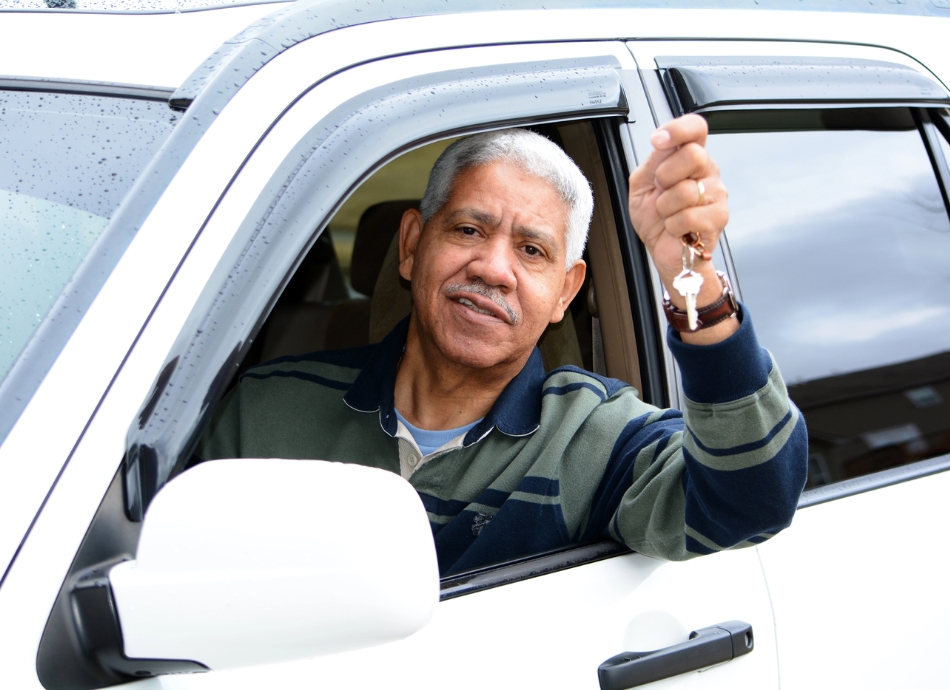
- If you have dementia or mate wareware you will have to stop driving one day.
- Even if your dementia is mild you may need to stop driving or only drive in some situations.
- Once you have a moderate dementia, you're no longer safe to drive. This is often the time when you can no longer cook, shop, use your computer or manage your finances properly.
- If you have dementia you need to listen to the concerns of your friends and family.
- Cognitive testing is not the best way to predict driving safety, on-road tests(external link) are the best way of identifying those who should give up driving.
- You may also have other medical issues such as poor eyesight, changeable blood pressure, and medicines that affect how safely you can drive. Read more about driving and medicines.
The information provided below is for people with early dementia and those who care for them.
Dementia (mate wareware) is a set of symptoms that go along with a decline in how well your brain functions. It can include problems with memory, thinking, how you behave and your ability to perform familiar, daily tasks – one of which is driving. Read more about dementia.
If you have dementia it can affect your ability to drive safely. You may have increasing problems with:
- remembering where you’re going and finding your way from A to B
- remembering which way to turn when you get to an intersection or roundabout
- judging distances – between moving cars, or between your car and other cars or objects
- working out how fast other cars are going
- your reaction time if you have to make a decision in a hurry such as if a car stops suddenly in front of you, or a child runs into the road
- your coordination.
Talk to friends and family
If you have any concerns that you might be developing dementia or having any problems with your ability to drive, ask friends and whānau what they think. They may well have noticed that your driving’s not as good as it was, or have their own concerns about whether you should be driving and be relieved that you can talk about it.
The thought of giving up driving, and the freedom it gives you, may be upsetting and frustrating. If you secretly have concerns about your driving you may find it a relief to talk about it with somebody who cares about you and understands how hard it might be. It’s important to think about your safety, and the safety of other road users, when you think about whether or not you should be behind the wheel.
Talk to your healthcare provider about whether you can still drive
If you've been diagnosed with dementia, you must talk to your healthcare provider about whether it’s safe to keep driving or not. While driving provides independence, it can be unsafe if your brain isn’t functioning as it should be.
Legally, your doctor has to assess your ability to continue driving. They may refer you to an occupational therapist for a driving assessment. This assessment is different from a routine driving test. Doctors have to let Waka Kotahi (the New Zealand Transport Agency) know if they think a person is unfit to drive but likely to carry on driving.
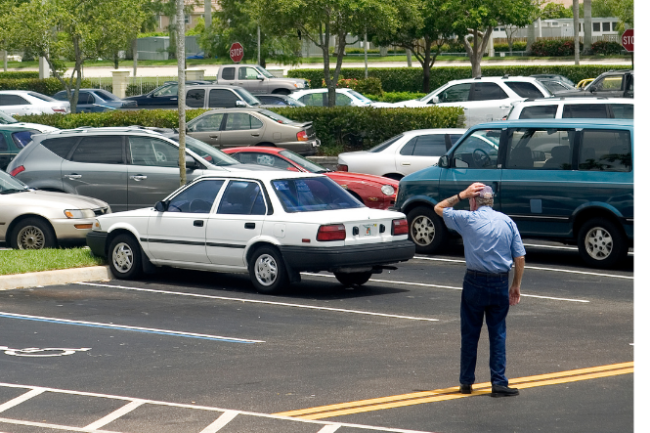
Image credit: Canva
Tell NZTA and your insurance company
Let Waka Kotahi (NZTA) and your insurance company know about your diagnosis. They will give you advice on what you need to do. Some insurance companies have strict rules about a diagnosis of dementia, so you may not be covered if you have a crash.
They may not require you to give up driving immediately, but will make a decision about your insurance cover based on:
- your circumstances, and
- the recommendations of your healthcare provider.
If you feel unsafe, stop
You can decide for yourself that it’s time to stop driving. If you feel unsafe or that you might not react quickly if needed, it's time to stop. It’s best to stop driving before a crash occurs or your ability to think and react quickly gets worse.
Plan ahead
Planning to retire from driving will make it easier for you and your loved ones. By thinking ahead you can limit your driving step by step and have time to replace it with other transport options. If you make the decision it lets you stay in control.
If you keep going when you're no longer fit to drive you may find your car keys are taken away against your will.
If you are still able to drive and want to keep going there are some things that could make it easier and safer for you.
- Get your eyesight, hearing and general health checked regularly.
- Stick to familiar, simple routes to drive.
- Choose times when you know the roads will be quiet.
- Don’t drive in bad weather or after dark.
- Take somebody with you. They can help you navigate and take over if you get tired or confused.
- Use GPS to help with directions.
- Allow plenty of time for your journey.
- Don’t drive if you’re having a bad day.
- Avoid having distractions in the car such as conversations, the radio, children or dogs.
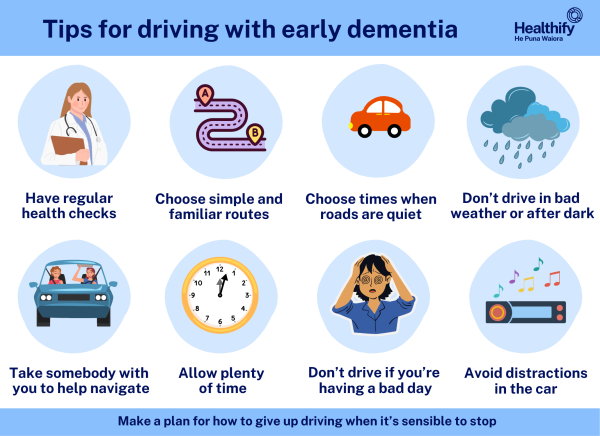
Image credit: Healthify He Puna Waiora
In the following video one man is continuing to drive but knows he’ll have to stop soon and talks about what he and his family are doing. Another has stopped driving and relies on his wife for transport.
Video: Alzheimer's WA driving after a diagnosis
If you think it’s time to hang up the car keys, find out about other means of transport or financial help you may be entitled to. You could organise for friends or whānau to help you out with getting to appointments or social gatherings. Supermarkets and pharmacies can arrange home deliveries, or you could walk more which will also help you stay physically fit. Read more about coping without a car.
There might be some advantages in not driving
- Owning and running a car is expensive – insurance, warrants, fuel, registration and repairs all cost money that could be used to subsidise other ways of getting around.
- You might enjoy your trips out more when the stress of driving is taken away. You can take in your environment more slowly if you’re walking or look at the scenery out of the window if somebody else is driving.
- If you walk more it will be good for your overall health and fitness. Take somebody with you and enjoy their company and conversation.
If you think a whānau member or friend is showing signs of dementia but is still driving, it’s important that you talk to them about it. It’s a difficult conversation to have. However, if you do it early – while they can think and talk about giving up driving and what other options are available to them – it will be easier. If you leave it too long, they may already be at great risk of harming themselves or others and will be less able to consider options such as managing public transport or selling their car.
What signs should I look out for?
If somebody has or is developing dementia you may find they:
- drive too slowly
- get confused when stopping or changing lanes
- get lost when driving a familiar route
- ignore road signs and traffic lights
- are not able to respond appropriately to what’s happening around them
- have minor accidents or arrive home with dents which they can't explain.
If the person chooses to continue driving, talk to their healthcare provider about your concerns and ask for an assessment.
How can I make the discussion easier?
- Start the conversation before they have an accident and use a change in their health status or a change in medicines as a starting point.
- Be respectful and try to understand how they might be feeling. Imagining how you might feel could help you empathise with their situation.
- Keep conversations short, and try to keep calm.
- Put it in context, everyone has to stop driving sooner or later, and other people have to stop for other reasons.
- Try to think about what driving means to them and see if you can replace some of what they will lose with other things.
- Talking about the chance of hurting an unpredictable child can be a more powerful reason than the chance of hurting themselves, which they may believe won't happen to them.
When they stop driving how can I help them cope?
Giving up driving can be an easy decision for some people but others struggle with the loss of independence, freedom and self-esteem. Try to be understanding and help them to work out other ways of getting around without driving themselves.
Options include:
- walking
- using public transport
- using total mobility vouchers to pay for taxis if they can’t catch a bus
- involving friends, whānau, carers and local groups in providing transport.
Find out more about managing without a car.
Waka Kotahi (NZ Transport Agency)(external link)
Alzheimer’s NZ(external link).
Brochures
Dementia and driving(external link) NZ Transport Agency, NZ, 2023
Getting a diagnosis of dementia(external link) Dementia Canterbury, NZ, 2023
Information for family and friends(external link) Dementia New Zealand, 2023
Positive communication (external link)Dementia New Zealand, 2022
The dementia and driving toolkit(external link) Dementia Canterbury, NZ, 2024
Apps
References
- Living with dementia – driving(external link) Alzheimers New Zealand
- Dementia and driving(external link) NZ Transport Agency, NZ
- Driving and dementia(external link) Dementia Australia
Dementia and driving safety – a clinical guideline(external link) Alzheimers New Zealand
Driving assessment for patients with dementia – a how-to guide(external link) Goodfellow MedCases, NZ, 2020
Driving rules and assessment for older people(external link) BPAC, NZ, 2010
See our page Dementia for healthcare providers
Brochures
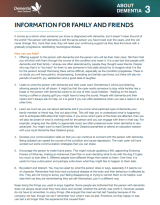
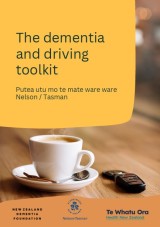
The dementia and driving toolkit
New Zealand Dementia Foundation, Alzheimers New Zealand Nelson/Tasman & Health New Zealand | Te Whatu Ora, NZ, 2025
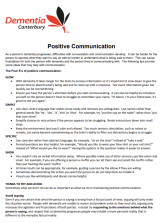
Credits: Healthify editorial team. Healthify is brought to you by Health Navigator Charitable Trust.
Reviewed by: Dr Mark Fisher, FRANZCP, Consultant Psychiatrist, Hinengaro Clinic, Auckland; Dr Emma Dunning Clinical Editor and Adviser
Last reviewed:





